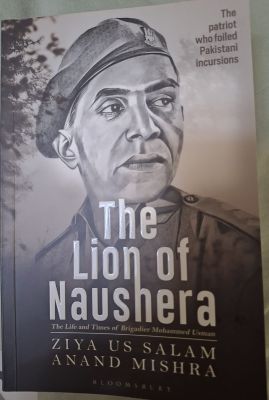The Lion of Naushera: A Story India Needed to Hear

Tish Malhotra, an avid bibliophile and regular contributor to this web-magazine, felt that Independence Day was a fitting moment to revisit the legacy of Brigadier Mohammed Usman—reverently known as the Lion of Naushera—who laid down his life defending India’s borders during the 1948 conflict with Pakistan. Without waiting for us or the publisher to supply him the book for review, he promptly acquired the book and completed it in time to share this thoughtful introduction of the book with our readers.
The Lion of Naushera: A Story India Needed to Hear
Tish Malhotra
In a highly charged atmosphere due to narrow religious and sectarian strife, it needs real courage to stand up and be counted to assert one's conviction. That is what has been boldly shown by the veteran media personalities and authors, Ziya Us Aslam and Anand Mishra. The former is the associate editor at The Hindu and the latter has been a political editor and works with the Frontline. They have recently come out with the most authentic and comprehensive biographical book on the life and times of Brigadier Mohammad Usman. Obviously, their courage of conviction can be felt between the lines. The book has been aptly titled, "The Lion of Naushera" because today the War Hero Brigadier Mohammad Usman is remembered by this name.
The book through its six parts highlights various important aspects of the life of the Brigadier. The message that keeps coming out prominently is that his life was completely guided by the spirit of the revolutionary idea of Ram Prasad Bismil: "The desire for sacrifice is there in our hearts. Let us see how much strength the executioner's arm possesses." This became a most powerful rallying clarion call for the Indian freedom fighters during the British Raj. Brigade Mohammad Usman truly carried it forward in the newly independent India so that the fellow citizens could live in peace and prosperity.
In their introduction, the authors describe the book as an effort to weave a rich, layered account of how Indians—across faiths, castes, and regions—united in the struggle for independence and later stood guard over the nation's borders against external threats. Through this work, they seek to "clear some of our debt to Brigadier Usman" by shedding light on the lesser-known chapters of his life and legacy. Given the scarcity of comprehensive literature on Brigadier Usman, especially beyond his role in the Battle of Naushera, the authors appear to have undertaken meticulous research. They pieced together his story through interviews with distant relatives and by combing through media reports, offering readers a rare glimpse into the life of a largely unsung hero.
The authors underline the fact that Brigadier Usman was actually posted at Kashmir almost immediately after independence. "It was a huge vote of trust not just for him but for the entire Muslim community, and a strong advertisement for the pluralist democracy India", the book says in its introduction.
As is said, the taste of the pudding lies in tasting. Hence following the dictum readers must have a personal copy of this unputdownable book. But here just to recapture, it can be briefed that gallant officer Brigadier Usman, who has become a symbol of patriotism, valour and self-less service to the nation, hailed from Azamgarh, Uttar Pradesh. He was the son of a Police Officer, joined the Royal Military Academy, Sandhurst, UK and was commissioned in British Indian Army 1934. During partition, he decided to stay in the pluralist India, though he had the offer of plum post in Pakistan Army. It was during 1947-48 Indo-Pak War, he led the Indian army to Naushera and Jhangar in Jammu and Kashmir. He attained martyrdom on 3 July 1948, just before twelve days before his thirty-sixth birthday. He was the senior most officer killed in action and was postthumosly awarded Mahavir Chakra.
The book, published by Bloomsbury, is a compulsory reading for the young and not so young Indians, keeping in view Brigadier Usman’s stellar qualities of pure heart and mind, loving kindness and magnanimity to help the needy. It was he who gave a call to his unit to go on fast on every Tuesday to save food so that those who are hungry could eat. Above all, he was the bridge between two communities. How? Please check the details in the book. At the same time do recall the patriotic song written by Kavi Pradeep and sung by Lata Mangeshkar: "Aye mere watan ke logo - zara aankh me bhar lo paani - O the people of m y country. Fill your eyes with tears and do remember the sacrifice of those who were martyred.”
*********

Tish Malhotra is a Delhi-based freelancer.
'The Lion of Naushera : The Life and Times of Brigadier Usman' by Ziya Us Salam and Anand Mishra is published by Bloomsbury and is available on Online platorms.
